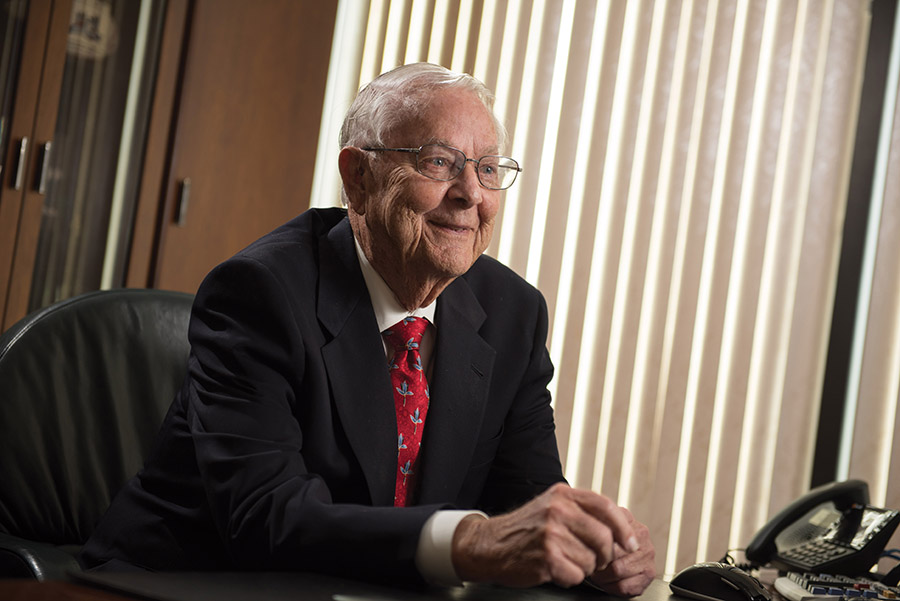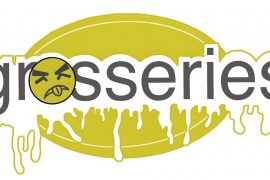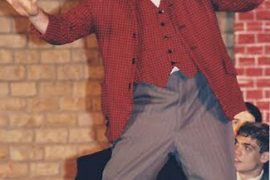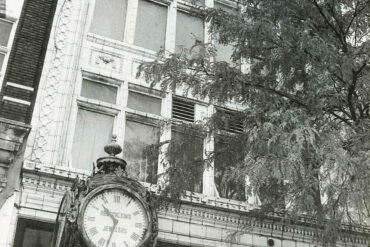Banker Bob Beymer has worked quietly behind the scenes for 58 years to help local individuals and businesses succeed in Huntington.
By Carter Taylor Seaton
HQ 98 | SUMMER 2017
Bob Beymer is an under-the-radar kind of guy. He’s not on the Huntington Wall of Fame, and his accomplishments rarely make headlines, yet everyone who knows him says he’s deeply involved in the life of Huntington, albeit behind-the-scenes. Currently, he’s the chairman of the board of First Sentry Bank, but that’s only the peak of his long banking career. His climb up that ladder began when he was just a child.
Picture a 10-year-old boy trudging through all types of weather to deliver both the morning and evening newspapers in his hometown of Ripley, West Virginia.
Now, imagine him as a teenager trapping muskrats and skunks to sell their hides on Saturdays. See him at age 32 behind his desk at Security Bank, the youngest bank president in Huntington. Watch him pilot a private airplane for 25 years. Now, meet that same man at age 88 as he walks three flights of stairs every weekday to his office at First Sentry Bank. Say hello to Bob Beymer.
Born to a rural mail carrier and his wife as the Great Depression loomed, Beymer was the youngest of seven children. His mother once told him, “I’ll give you clothes to wear and plenty to eat, but anything else you get you have to work for.” And he did. He says he’s had a paycheck ever since. In high school, he worked at the local Kroger in the evenings cleaning fish. He was also the starting quarterback of the football team his junior and senior years and was the leading scorer on the basketball team, earning the Best Athlete award at Ripley High School.
After high school, Beymer worked his way up to produce manager at Kroger, and in 1947 married a gal he’d met while passing the morning papers as a young boy. He says he and Sue Wyatt didn’t date back then, but they were always best friends. After she was voted the prettiest girl in high school, he realized what he’d missed and decided to pursue her romantically. They’ve been married 70 years and have three children, six grandchildren and eight great-grandchildren.

The year after his marriage, Beymer joined the bookkeeping department at the Bank of Ripley. He rose through the ranks quickly, becoming a teller, then assistant cashier. He left Ripley in 1955 to become the vice president of The Lincoln National Bank in Hamlin. Two years later, he became the executive vice president of Farmers and Merchants Bank in Summersville.
In 1959 Beymer moved to Huntington to join Security Bank. His first position was executive vice president and cashier, but he rapidly rose to become its president. In his spare time, he furthered his banking education at the University of Wisconsin-Madison’s Graduate School of Banking where he earned his degree in 1962. He also attended classes at the American Institute of Banking. It was there that he said he learned about the importance of the three C’s.
“People applying for a loan must have character, the capacity to pay and collateral,” Beymer explains. “But I quickly learned that collateral was the least important of the three. In fact, if a person didn’t possess the first two — character and capacity — then the loan interview was over.”
One couple who benefited greatly from Beymer’s instincts were Jack and Judy Eblin of Huntington. In 1968, following a stint in the U.S. Navy, they returned to Huntington with plans to open a dental office. Unfortunately, no banks in town would grant them a loan unless their parents cosigned the note. Then, they met Beymer.
“Not only did he agree to lend us the money, but he also offered to help us get started by finding us office space,” explains Judy Eblin. “He happened to own a house near the bank and offered to tear it down and construct a new building to our specifications. He said he would charge us rent, and if we wanted to purchase it in 10 years we could do so. And that’s exactly what we did. Bob Beymer got us out of a big hole, and we are forever indebted to him.”

Beymer would go on to serve as president of Security Bank for 25 years. In 1983 the bank was acquired by One Valley Bancorp (now BB&T). Three years later, Beymer decided to retire. Looking back, he says he’s just an ordinary man, a people-person, but others see him differently.
“What makes Bob a good banker and a good person is that he is genuine,” notes Geoff Sheils, the current President and CEO of First Sentry. “His word is his bond. What’s more, he has a great sense of humor. He tells the best jokes, is the master of the comeback line and has one of the quickest wits I’ve ever encountered. And you won’t find a better storyteller in all of Huntington. Whether he’s telling tales about his golf game or his adventures in flying, his self-deprecating humor is priceless.”
“He has an eye for businesses,” says Ed Morrison, president of C.I. Thornburg and board member at First Sentry Bank. “There is no need for analytics with Bob. He just instinctively knows a good deal from a bad deal and has the ability to make complex plans work.”
Businessman Marshall Reynolds says Beymer has great instincts about most everything. Reynolds first met Beymer when he was selling printing products to Security Bank. He realized that Beymer’s talents could be valuable to him.
“He knows how to get to the crux of the matter. There’s no BS with Bob. He decides who ought to be doing business with the bank and goes out and introduces himself. His approach is to meet his customers one-on-one and seal the deal with a handshake,” says Reynolds.
After Beymer retired, Reynolds was so impressed with his banking expertise that he tapped him to turn around several banks that he had acquired in Louisiana and Florida. After it took him no longer than a year to get them headed in the right direction, Reynolds began to call Beymer the “Bank Doctor.”
“He is a craftsman at turning any negative situation around,” Reynolds asserts.
Beymer says proper management can make or break a bank. His belief is that people will bank with someone they know. One of his first moves was always to put his office where the customers could see him.
“If you get to know the people and build a relationship based on trust, then they will bring their assets and their loans to you. Our customers bring us more repeat business than anything we do,” he explains.

In 1996, realizing there were no locally owned banks in Huntington, Reynolds and Beymer decided to launch one of their own. With the help of Robert L. Shell Jr., Joseph Williams and Dr. S. Kenneth Wolfe, the two raised $6 million in capital to open First Sentry in the old Dwight’s Restaurant building. Just 20 years later the bank’s assets were listed at $650 million. Those fortunate enough to buy stock in the new bank have been handsomely rewarded. Today, the stock’s book value is more than five times what it was at inception. What’s more, original shareholders have received all of their original investment back, and more, in cash dividends alone.
“Bob realized Huntington needed money to loan people in the community to invest in businesses, to help people,” says attorney Michael Farrell. “Bob provided that once First Sentry opened.”
In 1997, Beymer loaned Farrell the capital to buy his law firm’s current building on nothing more than Farrell’s signature.
“He said, ‘I know you; you’re good for this.’”
CPA Carl Callaway benefitted from Beymer’s help, too. He met Beymer when the accounting firm he worked for audited Security Bank. The two became fast friends and golfing buddies, and when Callaway began his own accounting firm, Beymer put the bank’s business with him.
“It was a pretty big client to have when you first start,” Callaway recalls. “That’s not unusual for Bob, though. He likes to see people succeed. If he had a customer at the bank who was struggling, he’d ask me to go meet with them and get involved.”
For Beymer, it is always about helping people and local businesses. The bank reports bear this: their ratio of business to personal loans is heavily weighted toward the business side.
“If you drive around Huntington you’ll see First Sentry listed as the funding entity on most building projects,” notes Farrell. “That’s because of Bob Beymer. First Sentry, through Bob’s leadership and the people he’s brought behind him, Geoff Sheils particularly, carries on his personal philosophy of ‘We’re here for you.’ ”
Sheils stepped into Beymer’s shoes in 2001, although he would say no one could ever fill them successfully. Sheils was working at Bank One in 1997 when Beymer invited him to lunch. The two had never met, and Sheils recalls the meeting vividly.
“The first words out of his mouth were ‘I’m going to make you an offer a young man in America cannot refuse.’” Sheils didn’t and has never regretted it.
“Yes, accepting his offer has exposed me to incredible professional opportunities and personal success, but it didn’t take me long to learn the true value of his offer,” Sheils says. “I am not sure a value can be placed on working beside and learning from Mr. Beymer for these 20 years. He is a tremendous family man and one of the most gifted bankers that I’ve ever met. His instincts for people are uncanny, and his philosophy that it’s all about the customer is rooted in deep experience.”
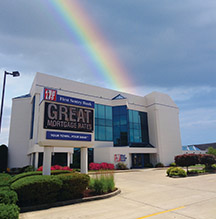
During his 58-year banking career in Huntington, Beymer has helped literally dozens of businesses get their start, while helping others expand. He credits eight customers at Security Bank for helping him get his own start in Huntington — C.R. Neighborgall Jr. at Neighborgall Construction, Al Logan at Atomic Distributing, Andy Houvouras and Leo DiPiero at Huntington Plating, Daryl Steinbrecher at Ducky’s Auto Parts, Jack Zitter at Sterling Supply, Web Morrison at C.I. Thornburg, Andy D’Antoni at Dan’s Sporting Goods and Dale Manns at Superior Marine.
“And I’m proud to say that seven of those eight businesses or families still bank with me today at First Sentry,” Beymer says with a smile.
Professionally, for Beymer it is all about the customers, but personally, it’s all about his family. He and Sue have three children — Robert, Bryan and Jill. Throughout his life, his only goal, he says, was taking care of them.
“I worried all the time what would happen if I didn’t have a job,” he admits.
He didn’t need to. His banking career and his investments paid off well; so well, that in his 20 years at First Sentry, he’s never taken a salary or any reimbursement for travel expenses. He says he didn’t take a salary because he wanted the bank to be successful for the community. It has certainly succeeded; today it is the largest bank in Huntington.
Farrell’s relationship with Beymer also includes finding charitable endeavors for him to donate monies to on behalf of himself or several of the trusts that he manages. One such trust grew out of a friendship born during Beymer’s days at Security Bank. A woman came to him for help with her will. He suggested she put the money in a trust, which he would manage. She agreed, and over the years, he’s taken her $800,000 and turned it into more than $2.5 million in donations to Huntington charities, including large gifts to Marshall University. Even Beymer, humble though he is, admits he’s proud of that.
According to Sheils, competitiveness is part of Beymer’s secret for success. He wants to win at everything, and his will to win permeates through his gin rummy and his golf game, as well as his professional life. Today, Beymer, a two handicapper in his prime, still golfs whenever the weather is good and plays cards most days.

So why, despite all his success and sterling reputation, haven’t more people heard of Bob Beymer? The answer is easy — he’s modest. A story that best illustrates that took place several months ago at First Sentry Bank. Sheils decided to surprise Beymer when he returned from a trip by installing a sign on the bank parking lot that read, “Reserved for R.H. Beymer.” That afternoon, security cameras caught Beymer removing the sign and tossing it into his car.
“The parking lot is for our customers,” he told Sheils the next day.
In many ways Bob Beymer is the last of the old-school bankers who relied more on their street smarts and intuition than complicated spreadsheets. Before federal banking regulations made loan applications an exhaustive exercise in paperwork, he made his loans with a single signature and a handshake. Today there are several generations of Huntingtonians who recall their parents advising them, “Just go see Mr. Beymer. He will take care of you.” What’s more, there are dozens of local businesses that were founded with the help of the unassuming banker from Ripley. And Huntington is all the richer for it.

